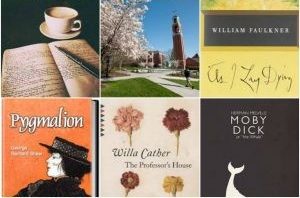
With the unveiling of Spring 2017 courses on Self-Serve, and numerous assignments to continue putting off, it seems to be the perfect time to cozy up with a warm pumpkin product and see what the English Department is preparing for next semester.
ENG 311 – Advanced Writing
TR 12:55 McDonald | TR 2:30 McDonald | MW 4:10 Hannon
In the words of Professor McDonald, Advanced Writing is “a writing workshop with a focus on process.” Guided by Father Pat or Professor McDonald, and supported by peer workshops, students will develop their own voices and unique narratives. The course draws upon different authors and historical writing styles, essays about the writing process, and specific workshops such as “Writing Stunning Sentences,” and “Writing Flash Non-Fiction.” At the end of the semester, each student will create a portfolio of original writing. This is an incredibly valuable experience; senior Kate Garcia attests that, “this class taught me to feel comfortable sharing my writing with others and how to accept and implement constructive criticism. I doubt I would have the level of passion that I do for writing if it weren’t for this class.”
ENG 326 – Shakespeare: Rep Plays
M 4:10 Swidzinski
Shakespeare: Representative Plays will be a comprehensive study of the Bard’s poetic and dramaturgical roles, his rich historical and socio-political scene, and the diverse interpretations made by his early modern to post-modern audiences. The course will be taught by Professor Swidzinksi, described by sophomore Caroline Holyoak as a thought-provoking instructor who, “approaches his job with the enthusiasm of someone who genuinely loves what he’s teaching.” Students will have the opportunity to read eight plays (Richard II, Richard III, Henry IV, Henry V, As You Like It, Hamlet, King Lear, and The Tempest) along with Shakespeare’s Sonnets. Professor Swidzinski will also be incorporating film adaptations of Shakespeare into the course, like Orson Welles’s renowned Chimes at Midnight.
ENG 343 – Studies in Non-Fiction
MWF 10:20 Hannon
Studies in Non-Fiction, taught by Father Hannon, is primarily an “intensive analysis of the methods, modes, and manipulations of nonfiction prose.” In such a realm, the tensions of storytelling – such as “truth and falsehood,” and “representation and reality” – are often hard to distinguish without philosophical guidance. In ENG 343, students will draw upon the support of both Father Hannon, who, in the words of Bekah Kolb, “encourages self-reflection in a warm, collaborative space,” along with nonfiction works such as essays, memoirs, political documents, documentaries, and reportage.
Ultimately, students in this course will gain a deeper understanding of the non-fiction narrative’s unique complexities and ethical tensions.
ENG 346 – Modern British Literature 1900-1945
T 4:10 Brassard
This is one of Professor Brassard’s favorite courses to teach, as she considers the early twentieth century to be both “jarring” and “tremendously exciting” in regards to literature. Unofficially subtitled “Gender, Class, and Sexuality in Modern British Literature,” this course will focus on the changing ideological narratives in an era of rapid technological, social, cultural, psychological development (not to mention the two World Wars.) The reading list will include Forster’s Howards End, Shaw’s Pygmalion, Ford’s The Good Soldier, First World War Poetry, Woolf’s Mrs. Dalloway, Bowen’s To the North, Rhys’s Good Morning, Midnight, Auden’s poetry, Orwell’s essays, and Mansfield’s short stories. According to senior Jackie Ott, Professor Brassard’s teaching style centers on collaboration, critical reflection, and “the fulfillment of individual expression.”
ENG 356 – American Literature 1914-1945
MWF 1:35 Larson
It seems that ENG 356 is not unlike ENG 346 in terms of historical and ideological tumult. For American literature, the period includes the Harlem Renaissance, the Great Depression, the two World Wars, and unsurprisingly, various questions about identity, society, artistic expression, and innovation. Dr. Larson, characterized by senior Tyler Tennant as being “thoughtfully insightful and thoroughly engaged in students’ discoveries,” is already looking forward to starting the discussion. He explains, “Ever since high school, I’ve been fascinated by this era’s primary contribution – a movement called modernism – and so I’m eager to plunge back into its puzzles and possibilities.” Students of American Literature 1914-1945 will be delving into such works as Willa Cather’s The Professor’s House, Ernest Hemingway’s In Our Time, William Faulkner’s As I Lay Dying, Eugene O’Neill’s Long Day’s Journey Into Night, as well as the writings of Stein, Frost, Hughes, and Eliot.
ENG 471 – American Romanticism
TR 2:30 Orr
American Romanticism, taught by Dr. Orr, will be a critical exploration into the American discourse and one’s dynamic place in nature, society, systems of faith, the workforce, the home, and the nation. Texts will include Emerson essays, Melville’s Moby-Dick, Hawthorne’s Scarlet Letter and The Blithedale Romance, the writings of Dickinson and Whitman, and perhaps Stowe’s Uncle Tom’s Cabin. Having taken American Romanticism the last time it was offered, alumna Ana Fonseca explains that, “What’s great about being in class with Dr. Orr is you look around and realize that there is probably no one in the world more excited than he is about this one text (ahem, Moby-Dick) or that one part (the part where Ishmael talks about the whiteness of the whale)… you realize how cool and wonderful it is that there is someone who this piece of writing brings a real giddiness and a real bounce in his step to, and that you get to be a part of it too.”
